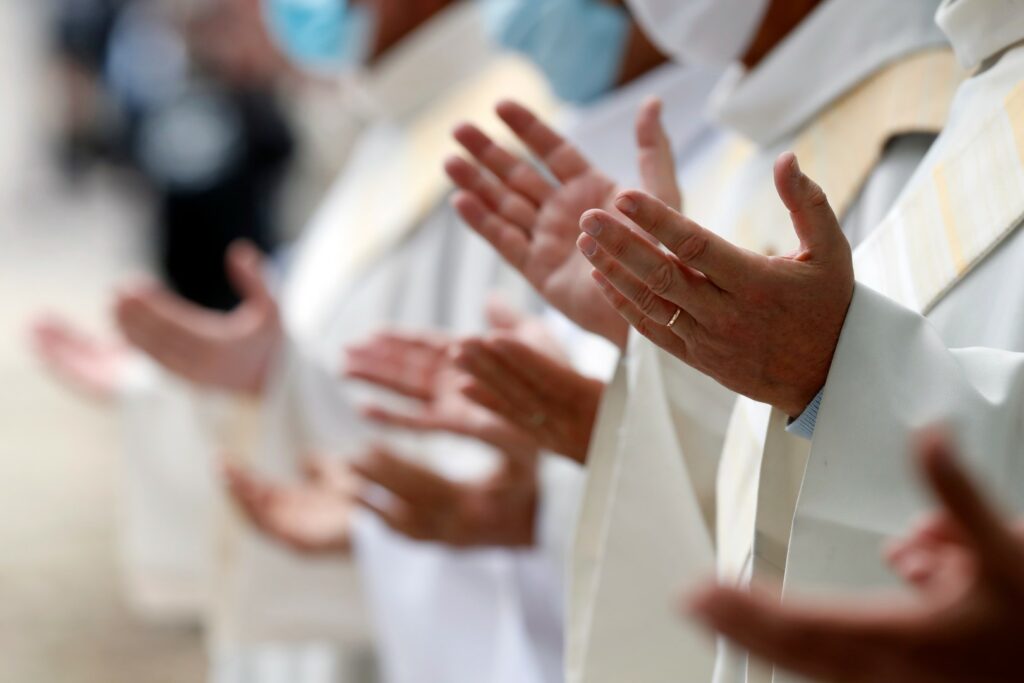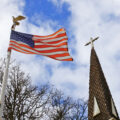Are Black priests in Europe invisible?
Are Black priests in Europe invisible?
European churches are relying on more and more African priests. Black clergy people do not go unnoticed, yet their situation is invisible. Why is that?
This weekly comment was written by Clémence Sauty and reflects her personal analyses and opinions, rather than those of EARS.
European Churches are relying on more and more African clergy people.[1] Churches coined the cautious expression “ministers from elsewhere” to designate those who serve away from their home country.[2]
The example of France, the “oldest daughter of the Catholic Church,”[3] is one among many. In 2020, priests from the African continent, and to a lesser degree from Asia, India, and Poland, accounted for a third of the active clergy.[4]
“From elsewhere” is a vague term that does not indicate any of the cultural and racial issues that clergy people of colour may face in Europe. Black priests are a growing minority on this continent. Yet, for no apparent reason, they are not acknowledged as such. How come that Black priests in Europe are made invisible?
Reading Black theology in Europe
Well before African seminaries sent clergymen to European churches, Europeans benefited from cultures that differed from their own. For instance, European feminist and queer theologians have been immensely enriched by the ‘liberation theology’ developed in Latin America.[5] [6]
Likewise, Black theology empowers not only African and Afro-descendant Christians. It also empowers European Christians. Dramatic events can trigger Christian Europeans to seek and learn more about Black theology. Lately, the uproar following George Floyd’s murder and the global emotion after Desmond Tutu’s death drew attention to the voices of religious people of colour.
“Decolonising Western Christianity”
Reacting to the Black Lives Matter movement, Europeans got interested in Black theology.[7] For instance, Justin Welby, Archbishop of Canterbury, called for reconsidering the representation of Jesus as a white man.[8] He indeed showcased a painting of a Black Jesus at his last supper.
Similarly, Catholic priest Pierre Riouffrait agreed that God is Black. He made it clear that reading Black theologians had renewed his understanding of God and of European Churches: “More than being ashamed (of racism), we need to ask for forgiveness and learn to be solidary with Black and indigenous people.”[9]
Reading Black theology and listening to Black voices often results in a slight effort to “decolonise Western Christianity.” Catholic priest Bruno Chenu argues that Europeans who listen to the voices of people of colour learn to stop equating “being Christian” with “being White” and “being White” with “being civilised.”[10]
Testifying to the unity of the Church
The ideal Christian Church is united at a global level.[11] This is the meaning of the word ‘catholic’: the Church embraces all people in all their differences.[12] In practice, however, multiple churches coexist in the world.
Globalisation favours mutual relationships between European and African churches.[13] International exchanges in a globalised world are a way of bridging the Church from inside. In this context, it is only logical that, with the decrease in “priestly vocations” in Europe, Christian authorities ask African priests for support.[14]
Taking African perspectives into account
The solidarity of African Christians toward European Christians is understandable. Nonetheless, the universality of the Church does not erase thousands of years of racist and colonial history. Black commentators like Clarisse Juompan-Yakam warn that displacing African clergymen in Europe could be detrimental to African churches.[15]
First of all, she notices that it is inappropriate to burden foreign priests with the responsibility to solve the “vocation crisis” in Europe.[16] Second, she remarks that African countryside parishes also lack ministers. Third, Juompan-Yakam explains that the priests who are transferred to France are the ones who have studied the most. Churches should avoid depriving Africa of its most educated clergy people in order to fill gaps in Europe, she says.[17]
Besides, churches have yet to survey the actual satisfaction of African priests in Europe. For the time being, no report allows for a clear evaluation of the difficulties and joys of “ministers from elsewhere.”[18] As their situation remains invisible, it is impossible to discern and tackle potential racist and colonial issues. Yet, it is common knowledge that expatriation raises challenges both for workers and employers.[19] It is also well known that the inclusion of Africans in Europe is taboo[20] and that Black priests themselves have reported being discriminated against.[21] [22] [23]
Recognising the importance of Black visibility
Ultimately, Christian churches worldwide need to be aware of the racial history and power relationships at play. Indeed, whether drawing inspiration from Black theology, or asking for the support of Black clergy people, European Christians benefit from African cultural and human resources.
In order to avoid exploiting those resources, Christian churches could develop more transparent and mutually beneficial agreements. They could also publicly give credit where credit is due and officially thank ministers of colour for their help. Promoting the visibility of African clergy people is key in making sure that they are treated fairly, rather than as some kind of strangers within.
This weekly comment was written by Clémence Sauty and reflects her personal analyses and opinions, rather than those of EARS.
Interested in similar topics? Go to our Dashboard and receive free updates.
[1] Number of priests growing worldwide, Vatican reports | Catholic News Agency
[2] (PDF) Les prêtres venus d’ailleurs : une mutation ecclésiale complexe | Arnaud Join-Lambert – Academia.edu
[3] Catholic Church in France – Wikipedia
[4] Prêtres « venus d’ailleurs », quel avenir ?
[5] Liberation theology – Wikipedia
[6] Liberation Theology and Feminist Theology: Similarities and Differences
[7] “Black theology”, une pensée pour la libération des oppressions – Reforme.net
[8] St Albans Cathedral’s black Jesus is a ‘bold statement’
[9] Dieu serait-il noir ? – Mission et Migrations
[10] « La théologie noire de Desmond Tutu est une théologie de la libération »
[11] The Unity of the Church – The Gospel Coalition
[12] Four Marks of the Church – Wikipedia
[13] Les effets de la mondialisation sur le christianisme contemporain
[14] En France, ces prêtres venus d’ailleurs – et surtout d’Afrique
[15] En France, ces prêtres venus d’ailleurs – et surtout d’Afrique
[16] Odon Vallet, Dieu et les religions en 101 questions-réponses, Albin Michel, 2012
[17] En France, ces prêtres venus d’ailleurs – et surtout d’Afrique
[18] Prêtres « venus d’ailleurs », quel avenir ?
[19] The Role of Expatriation in the Context of Managing Diversity in International Organizations
[20] Frontiers | Dimensions of Migrant Integration in Western Europe | Sociology
[21] “The pressure on the shoulders (of African priests) is enormous and people forgive them less things than they do to native priests” says father Juvénal Rutumbu, responsible for foreign priests in France. See here: Prêtres « venus d’ailleurs », quel avenir ?
[22] Église : la délicate intégration des prêtres « venus d’ailleurs »
[23] À propos des prêtres d’origine africaine Quelle place au sein de l’Église catholique belge ?






